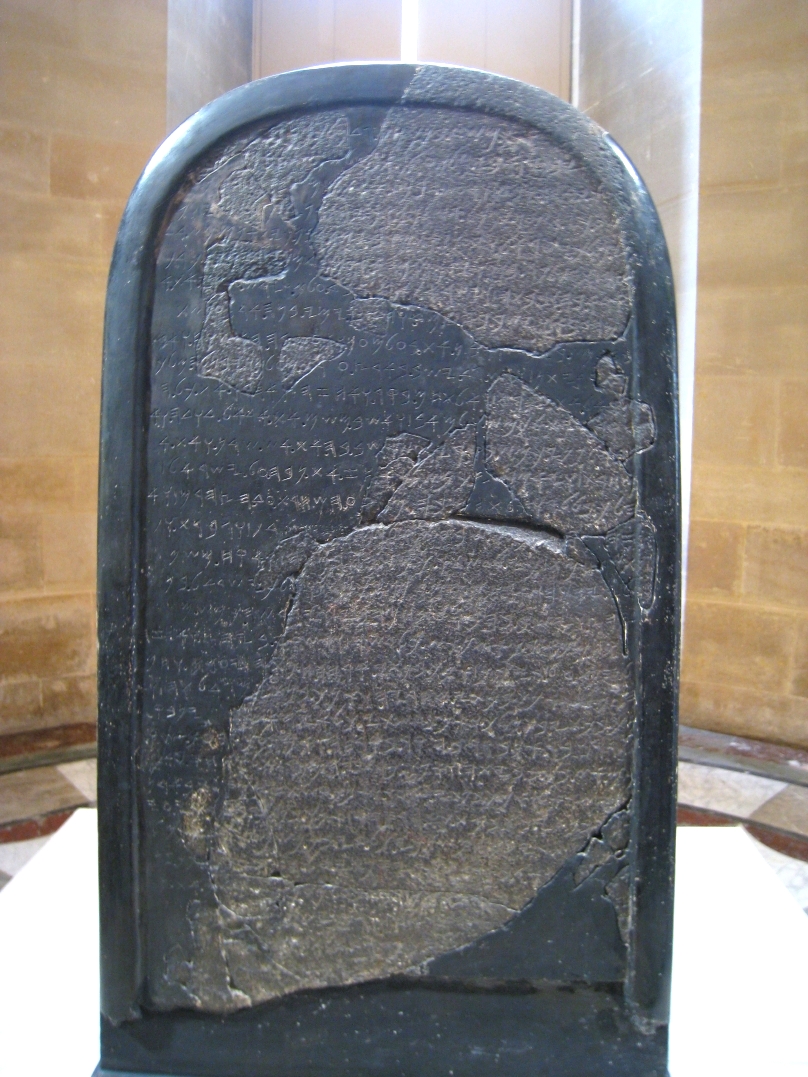|
Jehoshaphat (father Of Jehu)
According to the Hebrew Bible, Jehoshaphat was the father of King Jehu and the son of Nimshi Nimshi ( he, נִמְשִׁי ''Nīmšī''; Latin and Douay–Rheims: Namsi) is a character in the Hebrew Bible. He is mentioned in the Books of Kings and the Second Book of Chronicles as father, grandfather, or possibly a forebear of Jehu, the ki .... He is mentioned in , and . There are some points in the Bible that Jehu is called the son of Nimshi only., , and . Amitai Baruchi-Unna suggests that he was Omri's grandson. References Hebrew Bible people {{bible-stub ... [...More Info...] [...Related Items...] OR: [Wikipedia] [Google] [Baidu] |
Hebrew Bible
The Hebrew Bible or Tanakh (;"Tanach" ''Random House Webster's Unabridged Dictionary''. Hebrew: ''Tānāḵh''), also known in Hebrew as Miqra (; Hebrew: ''Mīqrā''), is the Biblical canon, canonical collection of Hebrew language, Hebrew scriptures, including the Torah, the Nevi'im, and the Ketuvim. Different branches of Judaism and Samaritanism have maintained different versions of the canon, including the 3rd-century Septuagint text used by Second-Temple Judaism, the Syriac language Peshitta, the Samaritan Torah, the Dead Sea Scrolls, and most recently the 10th century medieval Masoretic Text, Masoretic text created by the Masoretes currently used in modern Rabbinic Judaism. The terms "Hebrew Bible" or "Hebrew Canon" are frequently confused with the Masoretic text, however, this is a medieval version and one of several ... [...More Info...] [...Related Items...] OR: [Wikipedia] [Google] [Baidu] |
Jehu
) as depicted on the Black Obelisk of Shalmaneser III , succession = King of Northern Israel , reign = c. 841–814 BCE , coronation = Ramoth-Gilead, Israel , birth_date = c. 882 BCE , death_date = c. 814 BCE , burial_place = Samaria, Kingdom of Israel , predecessor = Jehoram , successor = Jehoahaz , issue = Jehoahaz , father = Jehoshaphat Jehu ( he, יֵהוּא, translit=Yēhūʾ, meaning " Yahu is He"; akk, 𒅀𒌑𒀀 ''Ya'úa'' 'ia-ú-a'' la, Iehu) was the tenth king of the northern Kingdom of Israel since Jeroboam I, noted for exterminating the house of Ahab. He was the son of Jehoshaphat, grandson of Nimshi, and possibly great-grandson of Omri, although the latter notion is not supported by the biblical text. His reign lasted for 28 years. William F. Albright has dated his reign to 842–815 BCE, while E. R. Thiele offers the dates 841–814 BCE. The principal source for the events of his reign comes from 2 Kings. ... [...More Info...] [...Related Items...] OR: [Wikipedia] [Google] [Baidu] |
Nimshi
Nimshi ( he, נִמְשִׁי ''Nīmšī''; Latin and Douay–Rheims: Namsi) is a character in the Hebrew Bible. He is mentioned in the Books of Kings and the Second Book of Chronicles as father, grandfather, or possibly a forebear of Jehu, the king of the Northern Kingdom of Israel (compare with ). History The Hebrew word ''ben'' () can mean both a literal "son", or a male descendant. The biblical text describes Jehu as either the "son of Nimshi" (''ben Nimshi''); or as the "son of Jehoshaphat" (''ben Yehoshafat''), who is himself called the "son of Nimshi". Some scholars have therefore taken the phrase to mean that Jehu was not the actual son of Nimshi, and that Nimshi was either the grandfather or ancestor of Jehu, or even that Jehu belonged to a ''clan'' named Nimshi. Another possibility is that "son of Jehoshaphat" was a later addition, in which case Nimshi would be the father of Jehu. Baruchi-Unna suggests that Nimshi was a son of King Omri and a brother of King Ahab. Jeh ... [...More Info...] [...Related Items...] OR: [Wikipedia] [Google] [Baidu] |
Omri
Omri ( ; he, , ''‘Omrī''; akk, 𒄷𒌝𒊑𒄿 ''Ḫûmrî'' 'ḫu-um-ri-i'' fl. 9th century BC) was, according to the Hebrew Bible, the sixth king of Israel. He was a successful military campaigner who extended the northern kingdom of Israel. Other monarchs from the House of Omri are Ahab, Ahaziah, Joram, and Athaliah. Like his predecessor, king Zimri, who ruled for only seven days, Omri is the second king mentioned in the Bible without a statement of his tribal origin. One possibility, though unproven, is that he was of the tribe of Issachar. Nothing is said in Scripture about the lineage of Omri. His name may be Amorite, Arabic, or Hebrew in origin.Thiel, W., "Omri", ''The Anchor Bible Dictionary'', p. 17, vol. 5, D.N. Freedman (ed.). New York: Doubleday (1992) Omri is credited with the construction of Samaria and establishing it as his capital. Although the Bible is silent about other actions taken during his reign, he is described as doing more evil than all the ... [...More Info...] [...Related Items...] OR: [Wikipedia] [Google] [Baidu] |
Journal For The Study Of The Old Testament
The ''Journal for the Study of the Old Testament'' (JSOT) is a peer-reviewed academic journal covering the field of Biblical studies. The editors-in-chief are David Shepherd (Trinity College Dublin) and Lena-Sofia Tiemeyer ( Örebro School of Theology). It was established in 1976 and is published by SAGE Publications. The journal is associated with the Sheffield school approach, which engages in literary readings of the final form of the biblical text.Michael E. Travers,Formalism" in ''Dictionary for Theological Interpretation of the Bible'', p. 231. Abstracting and indexing The journal is abstracted and indexed in: * Academics Premier * ATLA Religion Database * Index theologicus Index (or its plural form indices) may refer to: Arts, entertainment, and media Fictional entities * Index (''A Certain Magical Index''), a character in the light novel series ''A Certain Magical Index'' * The Index, an item on a Halo megastru ... * New Testament Abstracts * Religion & Philo ... [...More Info...] [...Related Items...] OR: [Wikipedia] [Google] [Baidu] |

